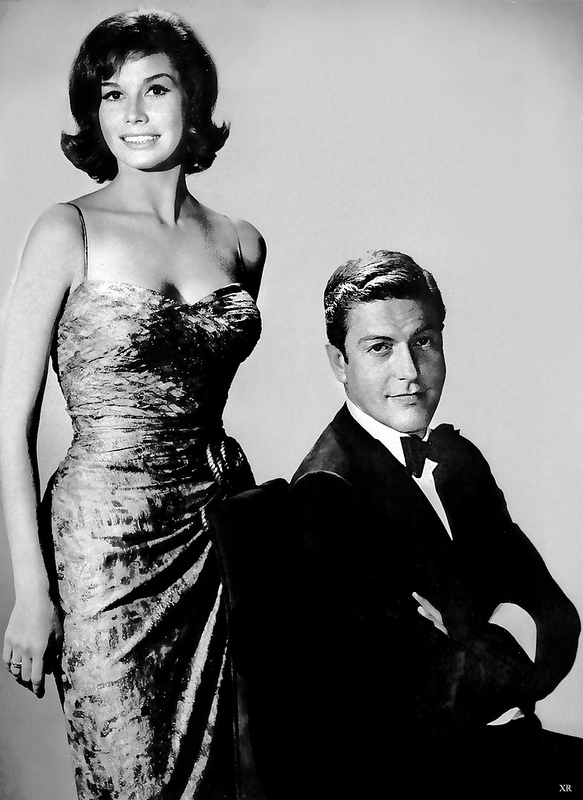Where is American television headed?
Where is American television headed? 5.00/5 (100.00%) 2 votes
Where is American television headed?
By Ray Hanania

English: Kat Dennings arrives at the showing of her movie Daydream Nation at the Ryerson Theater. (Photo credit: Wikipedia)
I am a Baby Boomer which means that I was basically there when Television was born. I watched it take it’s first steps, speak its first words in Black & White, and then watched it grow to technicolor. I stared at it hours on end as it transformed from a small little 16 inch tube to a 36 inch screen, from a metal box to a fancy Chinaberry Mohagony wood console with doors. It went from small speakers to blaring high fidelity. Skinny peg legs to large solid bases.
Oh, and I loved it.
When I was young, television was a partnership. You had to use your imagination. Television gave us new shows and we helped those show along by participating with our imaginations. Seriously, I didn’t think the aliens were actually coming when I watched the Twilight Zone. I didn’t think the Joker really was a criminal. Who could think that a man in a Batman costume could be a successful crime fighter? Could Gilligan really be so messed up on a deserted island, castaway with such unusual characters? There weren’t really a million stories and the city wasn’t naked at all. Queen for a Day really didn’t result in royalty. And I loved Lucy and her hilarious antics, even if Ricky Riccardo was more of a Latin stereotype than a film star.
And sex was a fantasy, a partner in imagination. No one really talked about sex, and Dick Van Dyke and Mary Tyler Moore didn’t sleep together int he same bed, even when they were married on the Dick Van Dyke Show. They slept in Twin beds, and we accepted it, as if there wasn’t something strange in that at all.
That was what was different from today. Today, there’s nothing left to the imagination. The sex is all out there. Vagina. Penis. Breasts. Those are the easy sex words I can talk about here. The intimate suggestiveness wasn’t outright pornography.
But turn on the television today and that’s about all you see. Cable TV and commercial TV are now one and the same. They both are costly monthly subscriptions. There’s no free TV. We’re paying for this salaciousness. Because we want it? Or because Television is constantly competing against itself?
Monday nights on CBS offers some hilarious situation comedies, or “sitcoms.” First, it is Two Broke Girls, a hilarious program that is so filled with pornographic dialogue there is very little left to the imagination. It’s funny. It’s talented. But it’s talented in a cheap way. The series doesn’t need me as a partner. They don’t want my imagination at all. I sit an watch and they do all the work. I laugh and they spill out sex after sex after sex, without a condom and without lubrication, either.

1961 … ‘The Dick Van Dyke Show’ (Photo credit: x-ray delta one)
Right after I wonder why I never met too loosey-goosey hot babes like Kat Dennings and Beth Behrs. You literally want to do it on the top of the TV, except that today’s TV sets are flat screens about two inches thick, and they have no counter tops to do anything on anyway.
And it doesn’t stop. It moves right into another show called Friends with Better Lives that takes the sexed-up dialogue to an even lower level.
Again, it is funny. It’s clever. Great actors and actresses. All about sleeping with prostitutes, having male sex and more sex with whomever.
Fine. What’s the problem with sex anyway? Nothing. But it is only 7 pm and 7:30 pm. Batman was on at 6:30 at night when I was a kid.
Doesn’t it all make the sex less exciting?
When I was doing my standup comedy right after the turn-of-the-century — that really sounds old but we’re only talking about 2001 to 2014 — I remember how younger audiences didn’t react to the deeper humor that lacked the four-letter words and foul language. That Friday night crowd at 10 pm wanted the F-word. You said the F-word and they laughed. I didn’t want to do the F-word in my comedy, or any of the other words that are so openly alluded to in today’s television sitcoms.
There is something clever about holding back, like preserving virginity. You just didn’t “F” the first guy you met. Well, most people didn’t. It was more exciting when you had to use your imagination when looking at a beautiful woman who was clothed in nice apparel. It takes talent to make people feel the sex without being so out there. You don’t need the F-word to make the audience feel it. Subtle humor is so much more satisfying. And sex is so much more personal.

American model and television host Michele Merkin. (Photo credit: Wikipedia)
Today’s younger generation and public in general has become used to lose of the line of where morality starts and ends. It was nice to have a clear breach between the two. It’s a lot like beauty and ugliness. You can’t appreciate the beauty until you see the hate.
When television takes away your virginity while you sit on the coach like an immobile and true potato, you’ve been raped by today’s television F-word screaming sitcoms. They don’t have to say the F word literally but they say it more explicitly today than it was said in the elementary school playground.
Yea, we knew all the bad words. But there was something exciting in knowing that you knew them but had to be careful not to say them, or get caught saying them. I forced you to define a line of conduct and respect. That’s gone today.
It’s not exciting. Excessively mature television programing is raping American audiences and we are just sitting there, — lying there — without a whimper of a protest. We’re just taking it. We’re letting it happen. And we’re laughing about it.
They say one thing leads to another. And I think that’s true. There were always drugs and guns when we were kids. Murder and mayhem was not invented by today’s generation. But it seems to me that when you make it easy to do something, you do that something more easily. More often. And maybe more recklessly.
The way we talk about sex today only drags our younger children who grew up without worrying about such things. We’re pushing the start date on sex to a younger age.
And that’s going to cause more trouble.
I don’t mean to pick on Two Broke Girls or Friends with Better Lives. They happen to be the ones that were on tonight. There are so many others, not just on unfree “Free” TV but on Cable TV channels like HBO and Showtime. And I’ve been dragged into shows that don’t mince words about what they are about, like Californication and Shameless.
They’re all great comedies and series. But isn’t there anyone left in our society who thinks that they could be even better if they pulled back on the reigns of the sex-talk and used their obvious talents to create clever dialogues that forced the audience to use their own minds a bit?
It’s the equivalent of slowly down on the expressway to take in a horrible traffic accident when people have been injured, crawling from their burning vehicles bleeding from their guts. “If it bleeds it leads” is a journalism phrase that represents the basic uncivilized animal within us all, even the Little Old Lady. We’re human. We see blood and guts and we stare. It’s so sick. We were disgusted.
I just think we could be so much better if the creators of today’s TV programs were more creative and used their talents to create scenarios that tapped our imaginations, instead of bludgeoning them with in-your-face raw visual and audio brutality.
(Ray Hanania is an award winning former Chicago City Hall reporter and political columnist. He is the Managing Editor of The Illinois News Network Online www.IllinoisNewsNetwork.com.)


Blogger, Columnist at Illinois News Network Online
Ray Hanania is senior blogger for the Illinois News Network online news site. He is an award winning former Chicago City Hall political reporter and columnist who covered the beat from 1976 through 1992 (From Mayor Daley to Mayor Daley).
In 1976, he was hired by the Chicago community newspaper The Southtown Economist (Daily Southtown) and in 1985 was hired by the Chicago Sun-Times and covered Chicago City Hall for both. In 1993, he launched the “The Villager” Newspapers which covered 12 Southwest Chicagoland suburban regions. He hosted a live weekend Radio Show on WLS AM radio from 1980 through 1991, and also on WBBM FM, WLUP FM and shows on WSBC AM in Chicago and WNZK AM in Detroit.
Hanania is the recipient of four (4) Chicago Headline Club “Peter Lisagor Awards” for Column writing. In November 2006, he was named “Best Ethnic American Columnist” by the New American Media;In 2009, he received the prestigious Sigma Delta Chi Award for Writing from the Society of Professional Journalists. Hanania has also received two (2) Chicago Stick-o-Type awards from the Chicago Newspaper Guild, and in 1990 was nominated by the Chicago Sun-Times for a Pulitzer Prize for his four-part series on the Palestinian Intifada.
Hanania’s writings have been published in newspapers around the world. He currently is syndicated through Creators Syndicate and his column is feature every Sunday in the Saudi Gazette in Saudi Arabia. He has written for the Jerusalem Post, YNetNews.com, Newsday in New York, the Orlando Sentinel, the Houston Chronicle, The Daily Star, the News of the World, the Daily Yomimuri in Tokyo, Chicago Magazine, the Arlington Heights Daily Herald, and Aramco Magazine. His Chicagoland political columns are published in the Southwest News-Herald and Des Plaines Valley News on several Chicagoland blogs including the OrlandParker.com and SuburbanChicagoland.com.
Hanania is the President/CEO of Urban Strategies Group media and public affairs consulting which has clients in Illinois, Florida, Michigan and Washington D.C.
His personal website is www.TheMediaOasis.com. Email him at:
[email protected].
Latest posts by Ray Hanania (see all)
Related
 Blog Posts
Blog Posts






Where is American television headed?
Where is American television headed?
By Ray Hanania
English: Kat Dennings arrives at the showing of her movie Daydream Nation at the Ryerson Theater. (Photo credit: Wikipedia)
I am a Baby Boomer which means that I was basically there when Television was born. I watched it take it’s first steps, speak its first words in Black & White, and then watched it grow to technicolor. I stared at it hours on end as it transformed from a small little 16 inch tube to a 36 inch screen, from a metal box to a fancy Chinaberry Mohagony wood console with doors. It went from small speakers to blaring high fidelity. Skinny peg legs to large solid bases.
Oh, and I loved it.
When I was young, television was a partnership. You had to use your imagination. Television gave us new shows and we helped those show along by participating with our imaginations. Seriously, I didn’t think the aliens were actually coming when I watched the Twilight Zone. I didn’t think the Joker really was a criminal. Who could think that a man in a Batman costume could be a successful crime fighter? Could Gilligan really be so messed up on a deserted island, castaway with such unusual characters? There weren’t really a million stories and the city wasn’t naked at all. Queen for a Day really didn’t result in royalty. And I loved Lucy and her hilarious antics, even if Ricky Riccardo was more of a Latin stereotype than a film star.
And sex was a fantasy, a partner in imagination. No one really talked about sex, and Dick Van Dyke and Mary Tyler Moore didn’t sleep together int he same bed, even when they were married on the Dick Van Dyke Show. They slept in Twin beds, and we accepted it, as if there wasn’t something strange in that at all.
That was what was different from today. Today, there’s nothing left to the imagination. The sex is all out there. Vagina. Penis. Breasts. Those are the easy sex words I can talk about here. The intimate suggestiveness wasn’t outright pornography.
But turn on the television today and that’s about all you see. Cable TV and commercial TV are now one and the same. They both are costly monthly subscriptions. There’s no free TV. We’re paying for this salaciousness. Because we want it? Or because Television is constantly competing against itself?
Monday nights on CBS offers some hilarious situation comedies, or “sitcoms.” First, it is Two Broke Girls, a hilarious program that is so filled with pornographic dialogue there is very little left to the imagination. It’s funny. It’s talented. But it’s talented in a cheap way. The series doesn’t need me as a partner. They don’t want my imagination at all. I sit an watch and they do all the work. I laugh and they spill out sex after sex after sex, without a condom and without lubrication, either.
1961 … ‘The Dick Van Dyke Show’ (Photo credit: x-ray delta one)
Right after I wonder why I never met too loosey-goosey hot babes like Kat Dennings and Beth Behrs. You literally want to do it on the top of the TV, except that today’s TV sets are flat screens about two inches thick, and they have no counter tops to do anything on anyway.
And it doesn’t stop. It moves right into another show called Friends with Better Lives that takes the sexed-up dialogue to an even lower level.
Again, it is funny. It’s clever. Great actors and actresses. All about sleeping with prostitutes, having male sex and more sex with whomever.
Fine. What’s the problem with sex anyway? Nothing. But it is only 7 pm and 7:30 pm. Batman was on at 6:30 at night when I was a kid.
Doesn’t it all make the sex less exciting?
When I was doing my standup comedy right after the turn-of-the-century — that really sounds old but we’re only talking about 2001 to 2014 — I remember how younger audiences didn’t react to the deeper humor that lacked the four-letter words and foul language. That Friday night crowd at 10 pm wanted the F-word. You said the F-word and they laughed. I didn’t want to do the F-word in my comedy, or any of the other words that are so openly alluded to in today’s television sitcoms.
There is something clever about holding back, like preserving virginity. You just didn’t “F” the first guy you met. Well, most people didn’t. It was more exciting when you had to use your imagination when looking at a beautiful woman who was clothed in nice apparel. It takes talent to make people feel the sex without being so out there. You don’t need the F-word to make the audience feel it. Subtle humor is so much more satisfying. And sex is so much more personal.
American model and television host Michele Merkin. (Photo credit: Wikipedia)
Today’s younger generation and public in general has become used to lose of the line of where morality starts and ends. It was nice to have a clear breach between the two. It’s a lot like beauty and ugliness. You can’t appreciate the beauty until you see the hate.
When television takes away your virginity while you sit on the coach like an immobile and true potato, you’ve been raped by today’s television F-word screaming sitcoms. They don’t have to say the F word literally but they say it more explicitly today than it was said in the elementary school playground.
Yea, we knew all the bad words. But there was something exciting in knowing that you knew them but had to be careful not to say them, or get caught saying them. I forced you to define a line of conduct and respect. That’s gone today.
It’s not exciting. Excessively mature television programing is raping American audiences and we are just sitting there, — lying there — without a whimper of a protest. We’re just taking it. We’re letting it happen. And we’re laughing about it.
They say one thing leads to another. And I think that’s true. There were always drugs and guns when we were kids. Murder and mayhem was not invented by today’s generation. But it seems to me that when you make it easy to do something, you do that something more easily. More often. And maybe more recklessly.
The way we talk about sex today only drags our younger children who grew up without worrying about such things. We’re pushing the start date on sex to a younger age.
And that’s going to cause more trouble.
I don’t mean to pick on Two Broke Girls or Friends with Better Lives. They happen to be the ones that were on tonight. There are so many others, not just on unfree “Free” TV but on Cable TV channels like HBO and Showtime. And I’ve been dragged into shows that don’t mince words about what they are about, like Californication and Shameless.
They’re all great comedies and series. But isn’t there anyone left in our society who thinks that they could be even better if they pulled back on the reigns of the sex-talk and used their obvious talents to create clever dialogues that forced the audience to use their own minds a bit?
It’s the equivalent of slowly down on the expressway to take in a horrible traffic accident when people have been injured, crawling from their burning vehicles bleeding from their guts. “If it bleeds it leads” is a journalism phrase that represents the basic uncivilized animal within us all, even the Little Old Lady. We’re human. We see blood and guts and we stare. It’s so sick. We were disgusted.
I just think we could be so much better if the creators of today’s TV programs were more creative and used their talents to create scenarios that tapped our imaginations, instead of bludgeoning them with in-your-face raw visual and audio brutality.
(Ray Hanania is an award winning former Chicago City Hall reporter and political columnist. He is the Managing Editor of The Illinois News Network Online www.IllinoisNewsNetwork.com.)
Related articles
Ray Hanania
In 1976, he was hired by the Chicago community newspaper The Southtown Economist (Daily Southtown) and in 1985 was hired by the Chicago Sun-Times and covered Chicago City Hall for both. In 1993, he launched the “The Villager” Newspapers which covered 12 Southwest Chicagoland suburban regions. He hosted a live weekend Radio Show on WLS AM radio from 1980 through 1991, and also on WBBM FM, WLUP FM and shows on WSBC AM in Chicago and WNZK AM in Detroit.
Hanania is the recipient of four (4) Chicago Headline Club “Peter Lisagor Awards” for Column writing. In November 2006, he was named “Best Ethnic American Columnist” by the New American Media;In 2009, he received the prestigious Sigma Delta Chi Award for Writing from the Society of Professional Journalists. Hanania has also received two (2) Chicago Stick-o-Type awards from the Chicago Newspaper Guild, and in 1990 was nominated by the Chicago Sun-Times for a Pulitzer Prize for his four-part series on the Palestinian Intifada.
Hanania’s writings have been published in newspapers around the world. He currently is syndicated through Creators Syndicate and his column is feature every Sunday in the Saudi Gazette in Saudi Arabia. He has written for the Jerusalem Post, YNetNews.com, Newsday in New York, the Orlando Sentinel, the Houston Chronicle, The Daily Star, the News of the World, the Daily Yomimuri in Tokyo, Chicago Magazine, the Arlington Heights Daily Herald, and Aramco Magazine. His Chicagoland political columns are published in the Southwest News-Herald and Des Plaines Valley News on several Chicagoland blogs including the OrlandParker.com and SuburbanChicagoland.com.
Hanania is the President/CEO of Urban Strategies Group media and public affairs consulting which has clients in Illinois, Florida, Michigan and Washington D.C.
His personal website is www.TheMediaOasis.com. Email him at: [email protected].
Latest posts by Ray Hanania (see all)
Share this:
Related